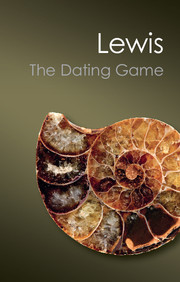Book contents
- Frontmatter
- Contents
- List of Illustrations
- Prelude to the Game
- A Brief History of Time
- Darwin's Sorest Trouble
- Mysterious Rays
- Doomsday Postponed
- Holidays in Mozambique
- This Vegetable Prison
- A Brimful of Promise
- Liquid Gold in Yenangyaung
- Durham Days
- The Ardnamurchan Affair
- Rewards and Retributions
- Why does the Sun Shine?
- The Age of Uranium
- The Age of the Earth
- Loose Ends
- Thanks and Acknowledgements
- Selected Bibliography
- Index
- Frontmatter
- Contents
- List of Illustrations
- Prelude to the Game
- A Brief History of Time
- Darwin's Sorest Trouble
- Mysterious Rays
- Doomsday Postponed
- Holidays in Mozambique
- This Vegetable Prison
- A Brimful of Promise
- Liquid Gold in Yenangyaung
- Durham Days
- The Ardnamurchan Affair
- Rewards and Retributions
- Why does the Sun Shine?
- The Age of Uranium
- The Age of the Earth
- Loose Ends
- Thanks and Acknowledgements
- Selected Bibliography
- Index
Summary
I don't pretend to understand the universe – it is a great deal bigger than I am.
Thomas CarlyleThe Earth is very old – present estimates put it at 4.54 billion years, ±45 million. Most of the rocks we see today have been recycled many, many times. They have been down to the bottom of the deepest oceans, buried kilometres below the surface of the Earth, before being uplifted once again to form the very highest peaks of the Himalayas, the Andes, the Rockies or the Alps, where erosion starts them on their weary way again, back down to the sea. The cycle goes on unceasingly. It has done so for billions of years in the past and will continue for billions of years to the future. At the same time the continents have moved around the globe, effortlessly, like so many birds on migration – once buried under glaciers at the poles they soon find themselves passing the equator en route to another destination.
Given all this mobility, it is hardly surprising that initially Holmes did not find very ancient rocks on Earth. Most of the evidence has disappeared long ago – but not all. In 1915 he predicted ‘It was in zircon that the hope of the future lay, for that mineral was widespread in time and place, and stable and resistant to external forces.’ Indeed, he was right; crystals of the mineral zircon have been found in Western Australia that, at more than four billion years old, are only a few hundred million years younger than the age of the Earth.
- Type
- Chapter
- Information
- The Dating GameOne Man's Search for the Age of the Earth, pp. 229 - 238Publisher: Cambridge University PressPrint publication year: 2012



